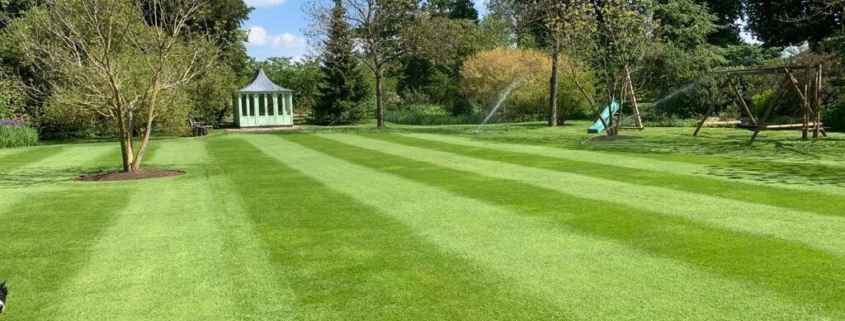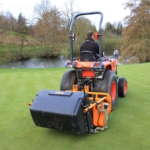Do you want to really learn sustainable lawn care for 2024?
The Lawn Association team know that sustainability is important no matter what area of your garden you are concentrating on.
Grass is like any other plants you may have… it needs pruning (mowing) and a lot of TLC, whilst at the same time the ability to work with nature rather than fighting against it.


Do you want to really learn sustainable lawn care for 2024?
Welcome to our tips for looking after your lawn kindly in 2024…
Re-looking at what makes a ‘perfect lawn’
By giving your lawn the care it needs to thrive, you are ensuring its long-term health and resilience. A healthy sustainable lawn is more capable of withstanding stress, adapting to changing weather conditions, and maintaining its green appearance. Therefore, while the visual appeal of stripes is certainly delightful, it should be considered as a secondary aspect to the overall health and well-being of the lawn. A sustainable and well-maintained lawn is the true definition of a perfect lawn.
Go native!
In the UK, native grasses play a crucial role in determining the health and appearance of lawns. Two main native grasses, bent and fescue, thrive exceptionally well in the UK. Fescues, known for their dominance in the UK, have the advantage of binding the turf together, resulting in a denser lawn. They are resilient and offer good shade protection, which helps the root systems cope with heat.
Fescues are widely used in general mixture grasses and are known to grow exceptionally well, contributing to the overall quality of lawns in the UK. Bent grasses, on the other hand, are commonly found in older lawns and are favoured for fine turf areas like bowling greens and golf courses. This doesn’t mean they are a ‘fine lawn only’ grass, as they cover most of the UK. They serve as excellent space fillers due to their growth characteristics. In domestic lawns, these grasses enhance the aesthetics, giving the impression of a lush carpet when properly maintained. By incorporating native grasses such as bents and fescues into your lawn management, you can promote a healthy and visually appealing lawn that is well-suited to the UK climate.
Happy soil and controlling thatch
A sustainably managed lawn with high-quality soil is beneficial for maintaining a healthy and weed-free grass cover. The presence of bacteria and microbes in the soil indicates a balanced and diverse soil ecosystem. These organisms play a vital role in decomposing organic matter, such as thatch, and recycling nutrients, making them available for plant uptake. Good soils that have native grasses and root systems naturally digest organic matter, unlike ryegrasses, which most people have alluded to purchase.
Thatch is the layer of dead grass, roots, and other organic matter that accumulates between the soil surface and the green grass blades. Excessive thatch can impede water and nutrient absorption, as well as provide a favourable environment for pests and diseases. By keeping thatch levels under control through natural decomposition processes, scarification becomes more about what it was invented for and that’s pruning or plant development.
Don’t let your lawn fail we need it!
We need healthy living lawns. They oxygenate the air we breathe. They remove CO2. They support biodiversity. They play a key role in our collective battle to stop killing the world and everything that lives on it. Listen to what nature tells you! By promoting and maintaining healthy native living lawns there can be numerous positive impacts on both the environment and our quality of life. It is important to strike a balance between a well-kept lawn and sustainable practices to minimise the use of harmful chemicals and excessive water consumption.
But saying that, lawn care itself needs to change with many promoting un-sustainable practices.
Our core mission at the Lawn Association is to make accurate lawn care information readily available via our website and through our Free Membership Scheme for gardening enthusiasts.
Go to the @LawnAssociation Facebook page to join the Lawn Enthusiasts Group, and get free association membership via the website, www.lawnassociation.org.uk
For the latest industry news visit landscapingmatters.co.uk/news
Get all of the big headlines, pictures, opinions and videos on stories that matter to you.
Follow us on Twitter and Instagram for fun, fresh and engaging content.
You can also find us on Facebook for more of your must-see news, features, videos and pictures from Landscaping Matters




